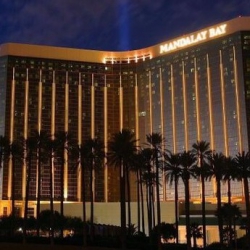Glenn Richardson, a man from Carlsbad, California, is appealing a $524,000 award in a lawsuit agaisnt the Mandalay Bay Resort and Casino. Glenn Richardson sufferered head and body injuries when a temporary sign collapsed and hit him near the Mandalay Bay’s pool area in 2015.
Originally, Mandalay Bay offered the man a $2.5 million settlement to avoid going to trial. Richardson rejected the offer, which appears to have cost him nearly $2 million.
Adam Breeden, Richardson’s lawyer, said his client would appeal the decision with a filing to come in Clark County District Court. A spokesman for MGM Resorts International, the owner of Mandalay Bay, said the Las Vegas casino company respects the jury’s decision.
Glenn Richardson’s decision to take a risk on a lawsuit instead of the settlement has the added downside that he’ll pay much higher legal fees, both for the original lawsuit and the appeals process. In retrospect, the decision to go to court looks like a particularly bad one.
Nevada Gaming Laws
Those familiar with Nevada gaming laws and the Clark County District Court know that the legal system is weighted to support the casino companies. The casino executives are highly respected and influential local business leaders, so those who take the casinos to court do not have a good track record.
A knowledgeable local gaming lawyer should have advised their client to that effect. Of course, clients do not always follow the advice of their lawyers.
Adam Breeden might have advised Glenn Richardson to take the settlement and Richardson decided to go for a higher payout. Given the fact the injury happened at a casino, Glenn Richardson might well be the gambling type.
Arizona Slots Player Warns about Turning Stick Casino
Meanwhile, in an unrelated case, an Arizona casino goer is suing the Talking Stick Resort and Casino in Scottsdale because he says the casino paid out only 8% of what it should have on a jackpot win.
Ryan Sherry, a 47-year old man, told ABC 15 Arizona News that he won $50,000 on a slot machine at the Talking Stick Casino in April. According to Sherry, the three red double 7’s which appeared on the reel were advertised as a $50,000 jackpot on the slot machine’s pay table.
Instead, the casino staff paid out $4,000 on the winning combination. Normally that would be an exciting win for a slots player, but when one was supposed to be paid 12 times that amount, it is a huge disappointment.
“Why Is It Not $50,000?”
Mr. Sherry told The Arizona Republic when the winning reel symbols came up on the screen, “I jumped up. I was so excited.”
He said the machine only paid out $4,000. When he asked for a manager, the casino management told him that the machine paid out the jackpot correctly.
Ryan Sherry told the manager, “Why is this not $50,000? Look at the numbers, all the colors match, why is it not $50,000?”
When a casino technician investigated the machine, the investigator told Sherry that a light bulb was out on the machine, which made an orange “7” look red.
“That Doesn’t Seem Right”
The disappointed slots player said, “That doesn’t seem right. If it’s showing one thing, the reason why you have pictures up here is to give you a snapshot of what you’re getting close to, or what you should be paid out. If it’s something different, the machine is not actually working properly.”
Ryan Sherry filed two grievances and was told by the Salt River Prima-Maricopa Indian Community’s tribal gaming officials he could take his case to tribal court . The gambler said he worried that would not help, since the tribal court is comprised of jurists who stand to gain from the casino’s revenues. (Most tribal casinos pay members of the tribe a dividend.)
Ryan Sherry Warns about Turning Stick
After six months of fighting to have the correct payout paid to him, Ryan Sherry said he will not be playing again at the Talking Stick. As the saying goes, if the operator doesn’t pay out when they lose the bet, you never won in the first place.
Sherry recommended to other patrons not to visit the Talking Stick Casino. He added, “Hopefully this does not happen to you, but the only one way you can actually guarantee that this is not going to happen to you is don’t go to the casino.”
The Arizona Republic reports that casino laws vary from state to state and tribe to tribe (or gaming compact). Thus, it is hard to say whether Ryan Sherry will win his case. In most states, the gaming compact exempts tribal casinos from many state laws, because of sovereignty issues. Cases thus are routed to a tribal arbitrator, which usually sides with the casino.

